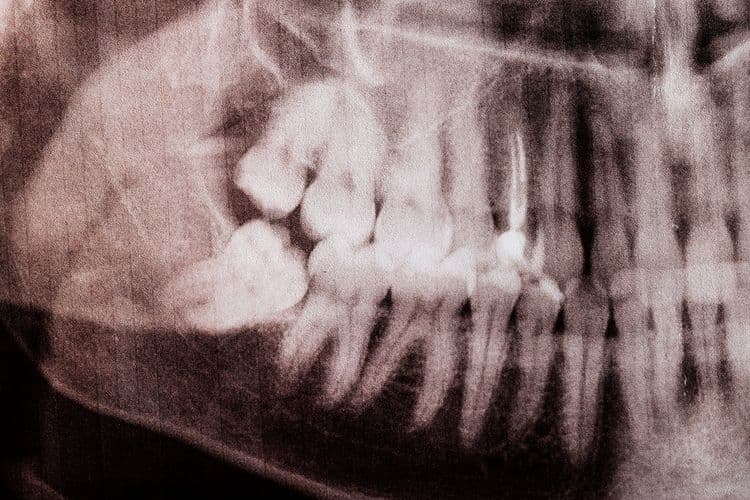The question of whether alcohol consumption is permissible following wisdom teeth extraction is a common concern among patients. Clinically, it is vital to evaluate the implications of alcohol on the healing process, particularly its potential to disrupt blood clot formation and interact adversely with prescribed analgesics. Understanding the timing and physiological effects of alcohol post-surgery is essential for best recovery. However, can patients afford to risk hindering their recovery by indulging too soon?
Understanding the Healing Process After Wisdom Teeth Removal
Following the extraction of wisdom teeth, the healing process is a complex interplay of biological events that necessitates careful management to guarantee ideal recovery. The healing timeline can vary, typically spanning from several days to a few weeks, contingent upon the individual’s physiological response and adherence to post-surgery care protocols. Initial inflammation is expected within the first 24-48 hours, a vital phase where adherence to prescribed analgesics and anti-inflammatory medications is paramount. Patients are advised to maintain oral hygiene meticulously while avoiding aggressive rinsing or spitting actions. Nutritional intake should be modified to include soft foods, minimizing mechanical irritation. Thorough post-surgery care, including regular monitoring for signs of infection or complications, is essential for optimal tissue regeneration and restoration of oral functionality.
The Role of Blood Clot Formation in Recovery
Blood clot formation is a critical component in the postoperative recovery following wisdom teeth extraction, serving as a protective barrier that facilitates tissue regeneration and minimizes hemorrhage. The integrity of this clot is paramount, as its premature displacement can greatly impede the healing process and increase the risk of complications such as alveolar osteitis, commonly known as dry socket. As a result, understanding the factors that contribute to clot stability is essential in mitigating risks and ensuring ideal recovery outcomes.
Importance of Blood Clots
The formation of a blood clot in the extraction site is a critical component of the healing process post-wisdom teeth removal. This clot acts as a biological barrier, preventing pathogens from entering the wound and reducing the risk of postoperative infections. Clinically, the blood clot importance extends to its role in hemostasis, where it helps to halt bleeding by initiating coagulation pathways. Additionally, the clot serves as a scaffold upon which new tissue can form, promoting granulation and epithelialization. Disruption or dislodgement of this clot, such as by premature alcohol consumption, can lead to complications like dry socket, characterized by severe pain and delayed recovery. Consequently, maintaining the integrity of the clot is essential for ideal healing trajectory.
Impact on Healing Process
A blood clot’s stability is vital for the recovery phase following wisdom teeth extraction. This clot acts as a biological bandage, essential for protecting the underlying bone and nerves, thereby facilitating ideal healing. Disruption of this clot can delay the healing timeline, potentially leading to complications such as alveolar osteitis. Clinical evidence indicates that alcohol effects can compromise clot integrity, due to its anticoagulant properties, consequently impairing the body’s natural healing mechanisms. In addition, alcohol can cause vasodilation, which may exacerbate bleeding and interfere with clot formation. This interference can prolong recovery, increasing the risk of infection and postoperative pain. As a result, abstaining from alcohol consumption is advisable to maintain the stability of the clot and promote an efficient healing process.
Risks of Dislodging Clots
Dislodging clots poses significant risks during the recovery period after wisdom teeth extraction, highlighting the critical role of stable blood clot formation. Blood clots function as protective barriers over the surgical site, preventing excessive bleeding and guarding against infectious agents. Their premature dislodgment can precipitate a condition known as alveolar osteitis, or dry socket, characterized by intense pain and delayed healing. This underscores the necessity of adhering to postoperative guidelines, which often include abstaining from alcohol consumption. Alcohol can interfere with clot stability and prolong the recovery timeline by altering hemostatic processes. Consequently, clinicians emphasize the importance of avoiding activities that could trigger clot displacement, thereby optimizing the recovery trajectory and mitigating associated blood clot risks. Adherence to these guidelines is essential for uneventful healing.
How Alcohol Can Affect Oral Surgery Healing
The consumption of alcohol following wisdom teeth extraction can considerably impede the healing process by interfering with tissue regeneration and cellular repair mechanisms. Alcohol has anticoagulant properties that may exacerbate bleeding, thereby increasing the risk of postoperative hemorrhage and compromising clot stability. Consequently, the combination of delayed wound healing and elevated bleeding risk underscores the importance of abstaining from alcohol during the critical recovery period after oral surgery.
Delayed Healing Process
Consuming alcohol following oral surgery, such as wisdom teeth removal, can greatly impede the healing process. The vasodilatory effects of alcohol contribute to delayed recovery by increasing blood flow to the surgical site, potentially disrupting the formation of blood clots necessary for healing. Alcohol’s systemic effects further exacerbate this by impairing immune function and reducing the body’s ability to combat potential infections. Ethanol has also been demonstrated to interfere with the synthesis of collagen, a vital protein for wound healing, thereby prolonging tissue repair. In addition, alcohol consumption can dehydrate oral tissues, leading to less than ideal healing conditions. Clinical studies consistently show that alcohol effects extend the duration of recovery, emphasizing the importance of abstaining from alcohol during the postoperative period to guarantee optimal healing outcomes.
Increased Bleeding Risk
Following wisdom teeth extraction, patients may face an increased risk of bleeding if they consume alcohol. Alcohol acts as a vasodilator, which can exacerbate postoperative bleeding by dilating blood vessels and impeding effective clot formation. This physiological response undermines bleeding prevention strategies critical for ideal recovery. Clinical evidence suggests that alcohol impairs platelet function, further complicating hemostasis. Consequently, the consumption of alcoholic beverages during the immediate postoperative period is discouraged. To mitigate the risk of hemorrhagic complications, oral health professionals advocate for strict alcohol moderation. Abstaining from alcohol for at least 48 to 72 hours post-surgery is advised to guarantee stabilized clotting mechanisms and minimize bleeding risks. Adherence to these guidelines facilitates a smoother healing trajectory and reduces potential adverse outcomes.

Pain Management and Alcohol Consumption
When considering pain management after wisdom teeth removal, it is essential to evaluate the interactions between prescribed analgesics and alcohol consumption. Ideal pain relief options typically involve non-steroidal anti-inflammatory drugs (NSAIDs) or acetaminophen. These analgesics effectively reduce postoperative discomfort when used as directed. Concurrent alcohol consumption may compromise their therapeutic efficacy and exacerbate side effects. Additionally, maintaining proper hydration is vital during the recovery period. Adequate fluid intake supports physiological processes and facilitates healing by promoting tissue perfusion and cellular repair. Dehydration, potentially potentiated by alcohol, can impair these recovery mechanisms, prolonging discomfort. Clinicians emphasize abstaining from alcohol to prevent these adverse outcomes and enhance the efficacy of pain management protocols, ensuring a more favorable postoperative course.
The Interaction Between Alcohol and Prescription Medications
While the postoperative period following wisdom teeth extraction requires careful management, the interaction between alcohol and prescription medications warrants particular attention. Alcohol interactions with medications such as analgesics and antibiotics can greatly alter medication effects, potentially compromising therapeutic outcomes. Opioid analgesics, commonly prescribed post-extraction, may experience enhanced sedative effects when combined with alcohol, increasing the risk of respiratory depression. Nonsteroidal anti-inflammatory drugs (NSAIDs) can exacerbate gastrointestinal bleeding when mixed with alcohol. Additionally, antibiotics such as metronidazole, if prescribed, can lead to a disulfiram-like reaction characterized by nausea and vomiting when alcohol is consumed. Healthcare professionals emphasize abstinence from alcohol to mitigate adverse effects and guarantee ideal medication efficacy during recovery. Clinical guidance underscores the importance of understanding these interactions to prevent complications.
Timing: When Is It Safe to Drink Alcohol Again?
How soon can one safely consume alcohol after wisdom teeth removal? Clinical guidelines typically recommend abstaining from alcohol for at least 72 hours post-surgery. This timeframe is vital to facilitate ideal healing and prevent interference with prescribed analgesics and antibiotics. Post surgery hydration is important during this recovery period, as alcohol can exacerbate dehydration and potentially delay the healing process. Patients are encouraged to prioritize fluids such as water, herbal teas, or electrolyte solutions to maintain hydration levels. Alcohol alternatives, including non-alcoholic beverages, serve as suitable substitutes that do not compromise recovery. Resuming alcohol consumption prematurely can disrupt the natural healing trajectory and should be approached cautiously. Adhering to professional recommendations guarantees a smooth and complication-free recovery phase.
Potential Complications From Drinking Alcohol Too Soon
Consuming alcohol prematurely after wisdom teeth extraction poses several risks that can compromise the healing process. Alcohol effects include vasodilation, which may exacerbate bleeding and inhibit proper clot formation at the extraction site, critical for preventing alveolar osteitis, commonly known as dry socket. The recovery timeline is typically 7 to 10 days, during which tissue regeneration and wound closure are paramount. Alcohol’s immunosuppressive properties can further impede recovery by reducing leukocyte function, increasing susceptibility to infection. Additionally, alcohol may interact adversely with prescribed analgesics or antibiotics, altering their efficacy and side effect profile. Deviating from advised abstinence can consequently extend the recovery timeline, leading to complications that necessitate additional interventions and prolonged discomfort for the patient.
Alternative Ways to Relax and Recover Without Alcohol
Following wisdom teeth extraction, patients can employ various non-alcoholic methods to facilitate relaxation and recovery, thereby optimizing the healing trajectory. Mindfulness techniques, such as guided meditation and deep breathing exercises, have been shown to greatly reduce stress and pain perception postoperatively. These methods activate the parasympathetic nervous system, promoting tissue healing through enhanced circulation and decreased inflammation. Additionally, herbal remedies offer a viable adjunctive approach. Chamomile, known for its anti-inflammatory properties, can be administered as a tea to soothe discomfort, while lavender oil, applied topically, may alleviate anxiety and promote relaxation. Clinical evidence supports these interventions as effective, non-pharmacological alternatives to alcohol, ensuring a conducive environment for wound healing and minimizing complications associated with conventional analgesics.
Tips for a Smooth Recovery Journey After Surgery
While non-alcoholic relaxation methods contribute to comfort, a thorough approach to post-surgical recovery encompasses several additional strategies. Ideal post-surgery nutrition plays a pivotal role, emphasizing soft, nutrient-dense foods to facilitate healing and maintain energy levels. A diet rich in proteins, vitamins, and minerals supports tissue repair and reduces inflammation. Concurrently, gentle oral hygiene is imperative to prevent infection and guarantee a favorable healing environment. Patients should utilize a soft-bristled toothbrush and antiseptic mouthwash, avoiding vigorous rinsing or spitting to prevent dislodging of the blood clot. Adherence to medication schedules, prescribed by a dental professional, further mitigates discomfort and swelling. These evidence-based practices collectively enhance recovery outcomes and minimize complications following wisdom teeth extraction.
Frequently Asked Questions
Can I Drink Non-Alcoholic Beer After Wisdom Teeth Removal?
Evaluating the recovery timeline post-wisdom teeth extraction, non-alcoholic options like non-alcoholic beer generally pose minimal risk. However, consulting a dental professional guarantees alignment with individual healing processes and any specific guidelines tailored to personal recovery needs.
Will Smoking Marijuana Affect Healing After Wisdom Teeth Extraction?
Smoking marijuana can potentially impair the healing process after wisdom teeth extraction. The marijuana effects might include reduced oxygen supply and increased bleeding risk, both of which could negatively influence tissue recovery and prolong the healing period.
Can I Use Mouthwash After Wisdom Teeth Surgery?
Post-operative care for wisdom teeth extraction advises against using mouthwash containing alcohol due to irritation risk. Patients should opt for non-alcoholic mouthwash types, adhering to a gentle rinse frequency of twice daily to promote healing.
How Long Should I Wait to Resume Exercise Post-Surgery?
Post-surgery, patients are advised to wait at least 3-5 days before resuming light exercise types. The recovery timeline for more intensive activities can extend to 7-10 days, depending on individual healing rates and clinical evaluations.
Are There Any Specific Foods to Avoid During Recovery?
During recovery, patients should prioritize soft foods to minimize discomfort and promote healing. Clinical guidelines advise avoiding spicy foods, as they can irritate surgical sites, potentially increasing inflammation and delaying the overall healing process.


